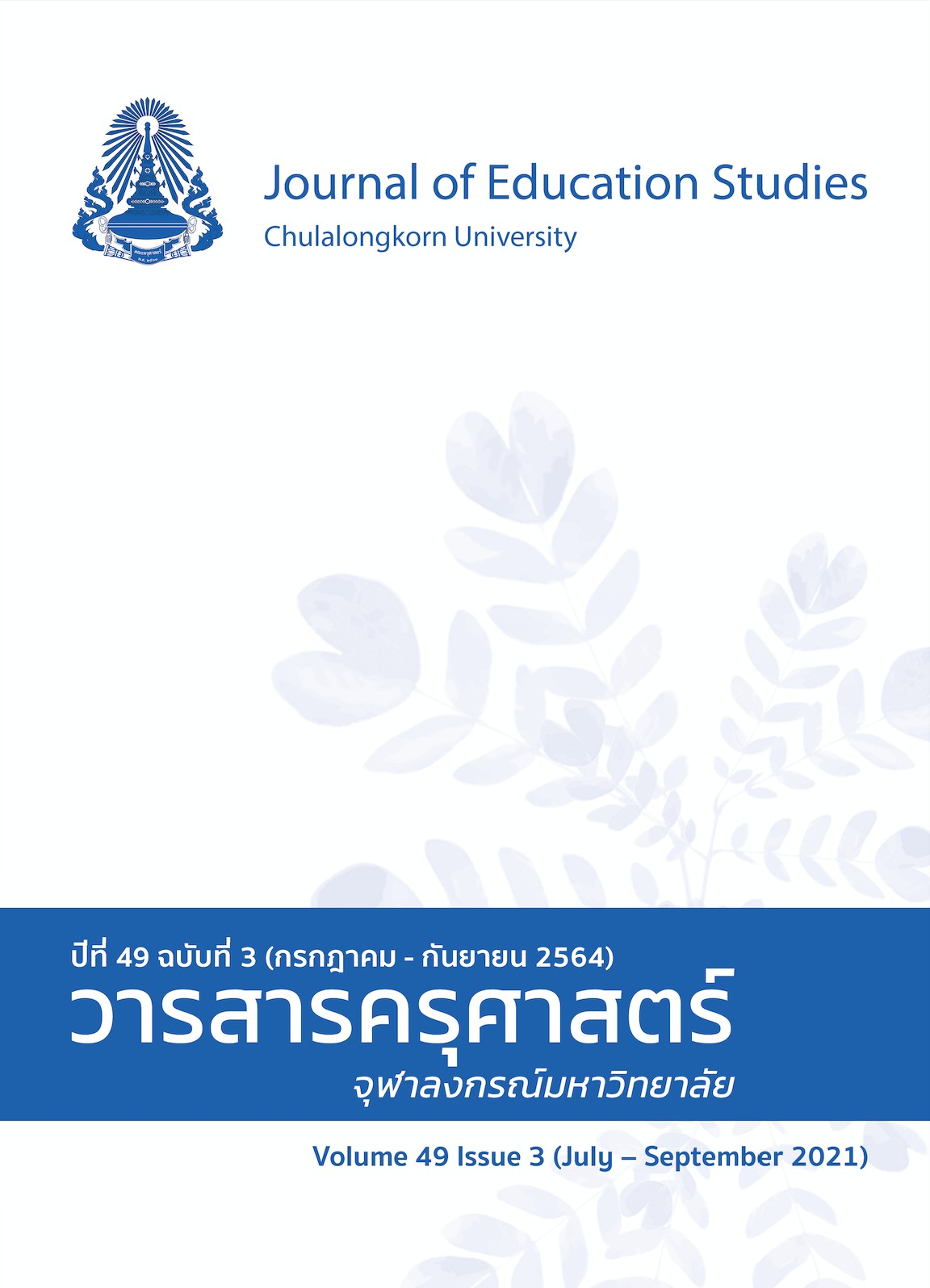The Study of Science Learning Achievement, Attitudes Towards Science, and Group Working Behaviors of Ninth Grade Students Using TGT Technique
DOI:
https://doi.org/10.14456/educu.2021.42Keywords:
TGT cooperative learning management, science learning achievement, attitudes towards science, group working behaviorsAbstract
The purposes of this study were to study of science learning achievement, attitudes towards science and group working behaviors of ninth grade students before and after using the TGT technique (Team Games Tournament) on genetic inheritance. The samples used in this study were a total of 41 ninth grade students who were selected by cluster random sampling method in the second semester of academic year 2019. By using the model of cooperative learning activities, the TGT technique consists of 5 steps are 1) the lead stage, 2) the team organization stage, 3) the competition stage, 4) the evaluation stage, and 5) the conclusion stage.Statistics used to analyze the data were mean, standard deviation, dependent and one-sample t-Test. The results of the research were as follows: 1) Science learning achievement of ninth grade students was higher after learning using the TGT technique andexceed 70% of the criteria., 2) Attitude towards science of ninth grade students was higher after learning using the TGT technique., 3) Group working behaviors of ninth grade students were at a good level after learning using the TGT technique.
References
ภาษาไทย
กระทรวงศึกษาธิการ. (2551). หลักสูตรแกนกลางการศึกษาขั้นพื้นฐาน พุทธศักราช 2551. คุรุสภาลาดพร้าว.
กมลรัตน์ ฉิมพาลี. (2559). การพัฒนารูปแบบการเรียนรู้เพื่อส่งเสริมความเข้าใจในธรรมชาติของวิทยาศาสตร์สำหรับนักเรียนระดับมัธยมศึกษาตอนปลาย [วิทยานิพนธ์ดุษฎีบัณฑิต]. มหาวิทยาลัยมหาสารคาม.
จินตนา เชื่อปัญญา. (2561). การศึกษาผลสัมฤทธิ์ทางการเรียนวิชาวิทยาศาสตร์ของนักเรียนชั้นมัธยมศึกษาปีที่ 2 ที่ได้รับการจัดการเรียนรู้แบบร่วมมือ โดยเทคนิคกลุ่มเกมแข่งขัน (Team Game Tournament) [วิทยานิพนธ์ปริญญามหาบัณฑิต ไม่ได้ตีพิมพ์]. มหาวิทยาลัยบูรพา.
ชาญณรงค์ พรรุ่งโรจน์. (2546). ความคิดสร้างสรรค์. ด่านสุธาการพิมพ์.
ทิศนา แขมมณี. (2547). ศาสตร์การสอน : องค์ความรู้เพื่อการจัดกระบวนการเรียนรู้ที่มีประสิทธิภาพ (พิมพ์ครั้งที่ 3). สำนักพิมพ์แห่งจุฬาลงกรณ์มหาวิทยาลัย.
นราวดี จ้อยรุ่ง. (2559). ผลสัมฤทธิ์ทางการเรียนวิชาชีววิทยาและพฤติกรรมการทำงานกลุ่มของนักเรียนสายวิทยาศาสตร์พิเศษ ชั้นมัธยมศึกษาปีที่ 4 ที่ได้รับการจัดการเรียนรู้แบบร่วมมือเทคนิค TGT [วิทยานิพนธ์ปริญญามหาบัณฑิต]. มหาวิทยาลัยบูรพา. http://digital_collect.lib.buu.ac.th/dcms/files/57910119.pdf
ล้วน สายยศ และ อังคณา สายยศ. (2543). เทคนิคการวิจัยทางการศึกษา. สุวีริยาสาส์น.
วัฒนาพร ระงับทุกข์. (2542). การจัดการเรียนการสอนที่เน้นผู้เรียนเป็นศูนย์กลาง. เลิฟแอนด์เลิฟเพรส.
วาโร เพ็งสวัสดิ์. (2551). วิธีวิทยาการวิจัย. สุวีริยาสาส์น.
วินุรักษ์ สุขสำราญ. (2553). ผลสัมฤทธิ์ทางการเรียนวิทยาศาสตร์และความสามารถในการแก้ปัญหาทางวิทยาศาสตร์ของนักเรียนชั้นมัธยมศึกษาปีที่ 4 ที่ได้รับการจัดการเรียนรู้แบบร่วมมือโดยใช้เทคนิค TGT [วิทยานิพนธ์ปริญญามหาบัณฑิต]. มหาวิทยาลัยศรีนครินทรวิโรฒ. http://ir.swu.ac.th/jspui/bitstream/123456789/958/1/Winurak_S.pdf
ศุภวรรณ์ เล็กวิไล. (2539). การพัฒนารูปแบบการสอนอ่านอย่างมีวิจารณญาณ ด้วยกลวิธีเรียนภาษาโดยใช้หลักการเรียนรู้แบบร่วมมือ สำหรับนักเรียนชั้นมัธยมศึกษาตอนต้น [วิทยานิพนธ์ปริญญาดุษฎีบัณฑิต]. Chulalongkorn University Intellectual Repository (CUIR). http://cuir.car.chula.ac.th/handle/123456789/11469
สถาบันทดสอบทางการศึกษาแห่งชาติ (องค์การมหาชน). (2561, 1 พฤษภาคม). คะแนนสอบ O-Net ม.3. www.niets.or.th
สำนักงานคณะกรรมการการศึกษาแห่งชาติ. (2545). พระราชบัญญัติการศึกษาแห่งชาติ พ.ศ. 2542 และที่แก้ไขเพิ่มเติม
(ฉบับที่ 2) พ.ศ. 2545. พริกหวานกราฟฟิค.
สำนักงานคณะกรรมการพัฒนาเศรษฐกิจและสังคมแห่งชาติ. (2559). สรุปสาระสำคัญแผนพัฒนาเศรษฐกิจและสังคมแห่งชาติฉบับที่สิบสอง พ.ศ. 2560-2564. คุรุสภาลาดพร้าว.
ภาษาอังกฤษ
Kagan, S. (1994). Cooperative learning and mathematics. Kagan.
Downloads
Published
How to Cite
Issue
Section
License

This work is licensed under a Creative Commons Attribution-NonCommercial-NoDerivatives 4.0 International License.




